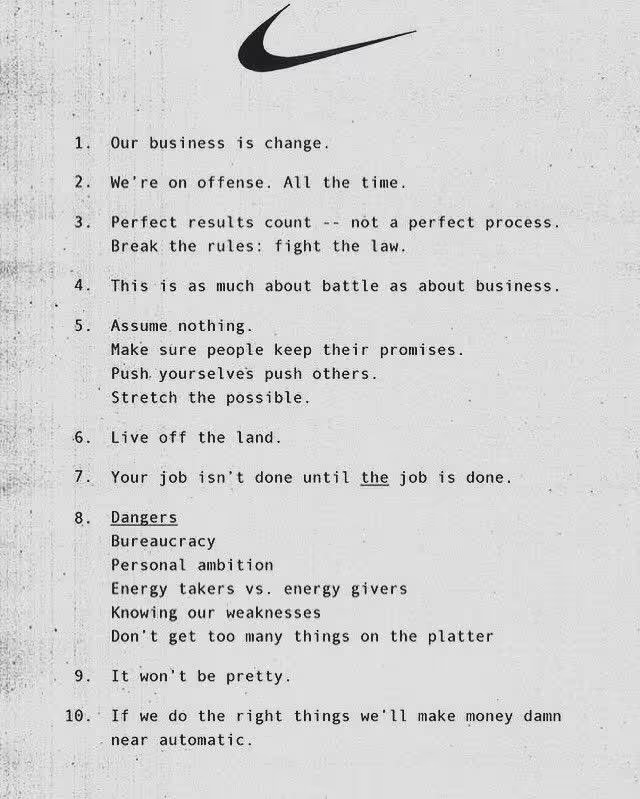Values are essential to the success of any brand. At Skyrocket, we help brands determine who they are and how they show up in the world. A large part of this is dictated by core values, which serve as anchor points for guiding business decisions and processes. Core values also provide the basis for the relationship that a brand forms with its customers. In this article, we’ll talk about what we mean by core values, why they are important to brand development, common misconceptions, and some examples to help you discover your brand’s core values.
What are core values?
Core values are a set of principles that an individual or a company defines to help guide decision-making. These principles help create direction for an organization while being used to unify their team and create a strong organizational culture. In the same way that personal values are used to determine one's own life decisions and morality, core values serve brands by existing as the principles they work by every day.
Why values matter now more than ever
In our world, where consumers are inundated with choice, the ability to set oneself apart from the competition and offer more than just a product or service is essential. Having a clear set of core values helps businesses describe themselves and build relationships with their customers, offering a way into their hearts and memories. “A company needs to be able to command awareness, but also convey what it stands for: its purpose and promise and values.” says Banana Republic Chief Brand Officer, Ana Andjelic, “for example, Nike and Apple offer product innovation and differentiated consumer experience. To evoke a specific meaning through its products, services, and experiences, a company needs to become a brand”. (Ana Andjelic, 2020) [URL: https://andjelicaaa.substack.com/p/assets-vs-brands ]. A set of defined core values play a major role in building companies into brands, offering a more memorable, personable, and relatable brand experience than companies without.

Benefitting from core values
To understand how to determine core values, it is important to first become familiar with their purpose and benefits. Here are just a few of the reasons why core values are useful:
- Values, along with purpose, are one of the more human-like attributes projected by modern brands. They serve as a reminder that every brand or business is made up of human beings.
- They give people involved with a brand a reason to believe in them over their competition. If our values align, we can be friends.
- They serve as the compass that guides actions, behaviours, and decision-making processes.
- They make a brand memorable. Company visuals, messages, and actions should be consistently communicating the brand’s core values.
Don’t fall into the virtue-signalling trap
Defining a brand’s core values is not as easy as it sounds. Many brands will approach a digital agency with a set of generic core values that don’t truly reflect who they are. Oftentimes, brands see the expression of core values as an opportunity to attract a certain customer and will articulate values as advertising or virtue signalling. They write their values based on the idea that someone will be reading those values, and they want to be the company that is known for having those values. However, values are not advertising.
“Values are the way you show up when no one is looking. Values motivate behaviours that you would engage in even if there was no economic advantage, even if there was a risk of punishment. As an individual, one might advertise ‘safety and responsibility as a value. But are you prone to speeding in your car? If so, the underlying value might be ‘rules are meant to be broken, I’ll do what it takes to get where I’m going.’ ” -Mo Dhaliwal, Director of Strategy at Skyrocket
If your values sound good but aren’t reflected in the way your company or its people show up, then you may have fallen into the trap of advertising virtues, rather than truly embracing your values.
Developing a list of candidate values
So how can a brand communicate its core values in a way that showcases who they are to their most important audiences? Well, that’s sort of a trick question. Values can’t be communicated in the traditional sense, they can only be experienced. Your values will be felt by those who interact with you.
This values experience is shaped by a lot of digging and discussion. A solid set of core values should be the following:
- Authentic: Your core values need to be true to the people behind your brand. They should reflect who you are, not who you wish you were or who your competition is.
- Specific: Being too broad or vague in your values doesn’t offer much to those reading them. Being specific with what you mean will help make your values memorable.
- Unique: Too often we see companies regurgitate generic or templated values like “customer-focused” or “forward-thinking”. Generic statements will not describe who you really are or set your brand apart.
- Actionable: Your core values need to reflect an action that an employee or customer can take to carry out that value. For example, “Integrity” implies that the brand is trustworthy, keeps its promises, meeting or exceeding expectations.
- Aligned: Core values should feel natural to the team and the organizational culture, in harmony with the mission, vision, and purpose.
When going down the path of developing values, it’s helpful to list off everything that is important to the organization and meets the above criteria. Over time, you’ll need to hone the list of values down to what is most essential.
Picking and listing your core values
Defining the core values of a business is not unlike personal development. Similar to how introspective personal work like going to therapy helps you understand who you are and how you want to be perceived, asking those same questions in the context of your organization can have a similar effect. When we work with our clients to develop their core values during our Discovery process, our goal is to direct them to the most honest and raw version of themselves. Our guided Discovery process allows us to understand the people behind the brands we work with and learn about their personal stories, attachment, and purpose in relation to their organizations. During these discussions, our team listens for prevalent themes and concepts and makes note of them. We find out what is important to our client and continuously ask “why” to keep digging.
Digging deeper through exploration
Our brand exercises are the most crucial part of discovery. These exercises help our clients describe themselves and their organizations in new, playful ways, letting us in on important details and revealing new insights. Our goal with unexpected or unusual questioning is to break participants out of their default responses and effectively force them to think in new ways. The results of the brand exercises help our clients understand who their brand ‘is’ and what values they hold, leaving them feeling more confident and connected to that persona in activities like decision making and culture building.
The resulting information from discovery sessions, the interviews, and exercise questions give our team what they need to work with to move on to the next steps. Once we have a solid understanding of our clients and their relationship to their organization, we pass those findings on to our writers, who distill the information to make suggestions for core values. This process is all about listening, learning, and providing an objective point of view. We propose a set of values that we feel authentically speak to the organizations we work with. The core values then influence the rest of the verbal identity we create for our clients, which allows them to communicate in a way that feels authentic to them while also speaking to their target audience.
To learn more about our discovery interview process, click here.

As an example, I’ll list the Skyrocket core values to showcase the level and depth we achieved for our own organization.
Go Live and Direct
Be forthright and straightforward in decisions and in how you communicate.
Take Care of Each Other
Having each other’s backs and standing up for one another, we work as a team moving towards a common goal.
Do What’s Necessary
Take adequate steps to achieve what needs to be accomplished. Make it happen!
Be a Genius
Use critical thinking and ingenuity to work through issues and make decisions.
We use these principles to guide our business decisions, motivate us, and influence the culture throughout our organization. These core values help us remember how we’re different from other agencies and keep us accountable to ourselves and our clients.
Core Values for a long-lasting brand
Core values are crucial to developing a strong brand identity. They provide context, personality, direction, and connection for people inside and outside of organizations. Why wouldn’t a brand want to be seen as authentic? Having a set of strong and unique core values will carry any organization further over time, and thus, the importance of defining them shouldn't be overlooked. When core values are clearly outlined, all other aspects of the brand identity can flow freely and naturally.





